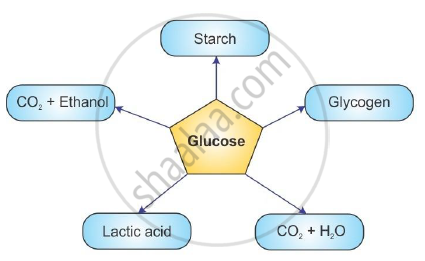Advertisements
Advertisements
प्रश्न
Distinguish between Glycolysis and TCA cycle.
उत्तर
| Glycolysis | TCA cycle/Krebs cycle |
| 1. The process of glycolysis occurs in the cytoplasm of the cell. | 1. Krebs cycle takes place in mitochondria. |
| 2. In glycolysis, one molecule of glucose is oxidized step-by-step to produce two molecules each of pyruvic acid, ATP, NADH2, and water. | 2. In Krebs cycle, a molecule of acetyl-co-A is completely oxidized and in the process CO2, H2O, NADH2, FADH2, and ATP is produced. |
| 3. Glycolysis can take place in both aerobic and anaerobic respiration. | 3. Krebs cycle takes place only during aerobic respiration. |
| 4. The first step in cellular respiration is glycolysis where glucese is converted into pyruvate. | 4. The second step in cellular respiration is Krebs cycle. |
| 5. Two molecules of pyruvate are obtained in glycolysis. | 5. Pyruvate is converted into CO2 and H2O during Krebs cycle. |
| 6. Two molecules of ATP are used up in glycolysis. | 6. ATP molecules are not used up in Krebs cycle. |
| 7. Four molecules of ATP are produced in glycolysis. | 7. Two molecules of ATP are produced in Krebs cycle. |
| 8. CO2 is not produced during glycolysis. | 8. CO2 is produced in Krebs cycle. |
APPEARS IN
संबंधित प्रश्न
Given below are the end products of different reactions involving glucose. Write the appropriate end product in front of the following:

(1) Anaerobic reaction =
(2) Reaction in human muscles =
(3) Aerobic respiration
(4) Reaction in plant cells =
(5) Reaction in liver =
Name the life process of an organism that helps in the growth of its population.
Why is diffusion insufficient to meet the oxygen requirements of multi-cellular organisms like humans
What criteria do we use to decide whether something is alive?
Which of the following type of energy is used by living organisms to perform vital life processes? Kinetic energy, Chemical energy, Potential energy, Nuclear energy
Name the green dot like structures in some cells observed by a student when a leaf peel was viewed under a microscope. What is this green colour due to?
Rewrite the food-chain given below with correct sequence.
Grasshopper– Snake– Paddyfield– Eagle– Frog
Fill in the blank and explain the statement.
Our muscle cells perform ______ type of respiration during exercise.
Write definition
Nutrients
Write the definition.
Proteins
Write definition.
Glycolysis
Give scientific reason.
Kreb's cycle is also known as citric acid cycle.
Answer in detail.
Explain the Kreb's cycle with reaction.
Complete the following chart and state which process of energy production it represents:

Why is there a difference in the rate of breathing between aquatic organisms and terrestrial organisms? Explain.
Name the organs that form the excretory system in human beings.
Find an odd one out.
What are the main energy sources of living organisms?
Explain the Steps of Glycolysis.
Assertion: When air is passed through lime water, lime water turns milky.
Reason: Air contains 78% nitrogen and 21% oxygen.
Choose the forms in which most plants absorb nitrogen
- Proteins
- Nitrates and Nitrites
- Urea
- Atmospheric nitrogen
How do the guard cells regulate opening and closing of stomatal pores?
Why do fishes die when taken out of water?
Match the words of Column (A) with that of Column (B)
| Column A | Column B |
| Phloem | (i) Excretion |
| Nephron | (ii) Translocation of food |
| Veins | (iii) Clotting of blood |
| Platelets | (iv) Deoxygenated blood |
Match the terms in Column (A) with those in Column (B)
| Column (A) | Group (B) |
| (a) Trypsin | (i) Pancreas |
| (b) Amylase | (ii) Liver |
| (c) Bile | (iii) Gastric glands |
| (d) Pepsin | (iv) Saliva |
Explain the following concept in short:
Balanced Diet
Explain the following concept in short:
Role of circulatory system in energy production
Give scientific reason.
Cell division is one of the important properties of cells and organisms.
Give one example of each of the classifications of vitamins.
